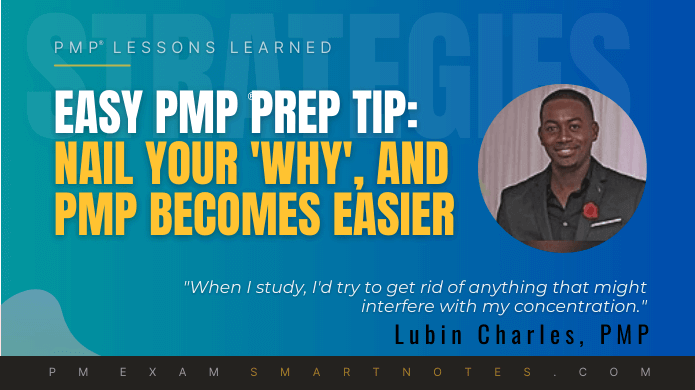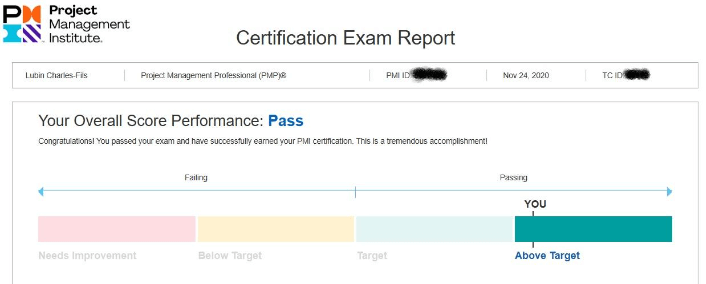 “Nail your WHY, PMP exam becomes easier”, was the one-liner secret to passing PMP exam that Lubin shared.
“Nail your WHY, PMP exam becomes easier”, was the one-liner secret to passing PMP exam that Lubin shared.
Lubin Charles has over 11 years of experience, is a certified PMI-PBA, PMI-ACP, and a Scrum Master.
With a bachelor’s in Computer Science, and master’s in Management, he has a well-rounded approach to project management.
He works as a Transition Manager, managing a wide range of projects from process improvement to new product development & launch.
When not dabbling with project related issues, Lubin loves to play chess, watch movies, and read.
He took 3 months to ace his PMP exam with Above Target score. And it all started with writing down the reason he wants to get PMP certified. Or, in his own words, the WHY.
Let’s hear how Lubin did it all.
👇 In a hurry? Watch this short video 👇
Why PMP?
I’ve been managing projects for some time now. I wanted to boost my career as a project manager and make sure I had the right skills recognized by companies in all industries.
 Upon some research, I discovered the Project Management Professional (PMP®)—which is the world’s leading project management certification in the field.
Upon some research, I discovered the Project Management Professional (PMP®)—which is the world’s leading project management certification in the field.
In my organization, I reached out to the colleagues who already held this certification to get their feedback. I quickly realized that this was the right credential for me.
Next, I developed a study plan, acquired the appropriate resources and began preparation.
Though I had other project management certifications, PMP is the gold standard in project management, and it is globally recognized and respected. And so, obtaining this certification was a way for me to validate all the experience and skills I have acquired in project management.
I can assure you that this credential delivers real value in the form of professional credibility, deep knowledge, and increased earning potential.
What was the core benefit you expected from PMP certification? And now that you are certified, how do you see PMP helping you?
Initially, the main benefit I was looking for was validation of my project management experience and skills, as I had been involved in project management long before I have decided to take this certification.
In addition, I also wanted to be more competitive in the marketplace.

Now that I am certified, not only do I feel confident that my project management skills are recognized, but it has also opened other doors for me. Headhunters are contacting me for job opportunities.
I’m not saying it’s just because I’m PMP certified. However, that certification is an important contributing factor.
Holding PMP certification tells employers and peers that you know what it takes to manage projects. It proves that you have the specific skills and experience that employers are looking for.
Also read:
- Top 5 PMP traps you must avoid!
- Find out how the new Talent Triangle by PMP impacts you.
- Hashiru Newland shows how to balance work and PMP preparation!
- Did you miss PMI’s 2022 Salary survey? See how much you’re expected to earn!
What is the one thing a PMP aspirant should have to pass it?
If I had to pick one thing that an aspirant PMP should have in order to properly prepare for and pass the exam, it would be practical project management experience.
The exam tests you at an expert level, and most of the questions are scenario-based or situational. Without hands-on experience, it can be very difficult for an aspiring PMP to pass the exam.
In terms of personality traits, one must be disciplined and consistent to put in the study effort. Although the format of the exam has changed recently, it is still challenging and requires commitment.
In addition, it is critical to create a clear mission statement explaining why earning the PMP is important to you.
Let me repeat, your WHY is crucial.
Next, create a study plan and plan to study regularly (this is where consistency comes in). There are a lot of materials, tools and techniques to cover and become familiar with.
You have to commit and be willing to make the sacrifice to see it through.
Which study resources did you use for your exam preparation?
As far as resources go, I think the following are enough to help anyone pass the PMP exam. I used them and passed the certification with an overall Above Target score.
- PMBOK Guide, the go-to reference book by PMI
- PMP Exam Prep Seminar – Pass the PMP on Your First Attempt by Joseph Phillips (PMBOK + Practice Exams)
- PMP Exam Prep book by Rita Mulcahy
- PMP Exam Flashcards by Rita Mulcahy
- PM FASTrack Exam Simulator (PMP® Exam Prep System, Tenth Edition)
What was your approach and study plan?
When it comes to my approach, first, I clearly defined why I wanted to be PMP certified.
Next, I contacted people who have this certification for advice and best practices. I set a S.M.A.R.T. objective and a realistic time frame (which was three months).
And finally, I procured the materials and resources necessary to prepare.
When I study, I’d try to get rid of anything that might interfere with my concentration.
For example, I turn off my phone or put it on silent and create an atmosphere around me that helps to mitigate the impact of any form of distraction during the time I am studying.
For the PMP, I studied an average of ten hours a week, and did my best to be as consistent as possible.
- I started with the Prep Course (by Philip Joseph on Udemy).
- After watching the videos, I read the PMBOK Guide.
- Then I read the Rita book.
- Next, I took mock exams to test my knowledge and went back to the Rita book to improve on the areas I did poorly on the mock exam.
Did you face any issues/blockers along the way?
Anything that can break your concentration and keep you from studying is a potential obstacle.
My main problem was that I had to keep my promises at work while preparing for the exam.
To overcome this, I tried to plan the work ahead of time, negotiate realistic deadlines with stakeholders, and avoid taking work home. Of course, there are always unforeseen circumstances, but you adapt as you go along.
As many people believe, the PMP journey is relatively long; 3 to 6 months. It can be longer for other for a variety of reasons. I managed to do it within 3 months.
It was a bit of a commitment.
One interesting and scary thing that happened along the way is that because there is so much material to cover, by the time I got to the end of the book, I lost sight of what is discussed in the early chapters.
To mitigate its impact on my preparation, I used the flashcards provided with Rita Mulcahy to familiarize myself with the terminologies, tools, and techniques.
Similarly, when I took my first full-length mock test, although I scored fairly well, I struggled to stay focused and maintain my energy until the end.
I had to practice and prepare my mind for this in order to do well on the real exam.
The week before the exam is crucial. How did you prepare during this week?
Indeed, the week before the exam is crucial. To that end, I did three things.
- I took my final practice exams.
- I reread the Flashcard to make sure I had mastered key terminology and concepts; this will make it easier to understand when reading the exam questions.
- I rested and slept well. The last thing anyone wants to do is cram during this week.
How was your exam experience?
I took my PMP at a Testing Center (Miami Dade College – Wolfson Campus, Florida, USA).
The support from the staff was great.
As I said before, the exam tests you at an expert level. I think the level of complexity of the questions depends on your preparation and practical project management experience.
For me, some of the answers were more or less obvious and others not so obvious.
However, with the right mindset, you can rule out options that are conspicuously erroneous.
Would you like to share any specific study tips, advice, techniques, or strategies for those preparing for their PMP exam?
I used to wonder as to why PMP is hard. Now that I have done it, I understand that there are few fundamental aspects of the exam, ignoring which can land you in trouble.
For those preparing for their PMP exams, I would say the following:
- Create a clear mission statement highlighting why earning the PMP is important to you
- Create a study plan and study on a regular basis (be consistent)
- Practice to test your knowledge
- Fix and fill the gaps as you identify them and take the exam.
All the best!
Get the most detailed review – including REAL videos. This week, get 2 courses for one (BOGO)!




